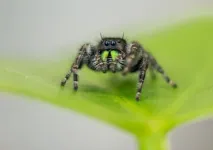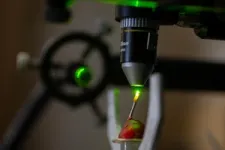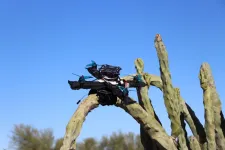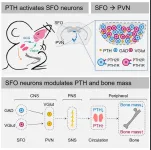(Press-News.org) Biologists at the University of Cincinnati discovered that underfed jumping spiders lose light-sensitive cells that are key to their vision.
UC College of Arts and Sciences Professor Elke Buschbeck and her co-authors studied photoreceptors in the eyes of bold jumping spiders, tiny eight-legged predators found across North America. The little hunters rely on their keen vision to stalk prey.
But researchers found that underfed spiders begin to lose photoreceptors that give them such good eyesight. Their findings could improve our understanding of the role that nutrition plays in common age-related vision problems such as macular degeneration.
The study was published in the journal Vision Research.
Their discovery occurred by serendipity while examining the eyes of wild-caught bold jumping spiders using her lab’s custom-made ophthalmoscope, which can take photos of the retinas of insects and spiders. They found dark spots on some of the spiders’ photoreceptors, suggesting they had degenerated during its life or development.
“You could tell just by looking at them that some of the photoreceptors had died,” Buschbeck said.
“But are the photoreceptors really degenerating?” UC doctoral student Shubham Rathore asked. “Or are they just getting bleached by the way we do the experiment?”
Rathore turned to electron microscopy to confirm that the cells indeed were dying.
The study suggests jumping spiders are a compelling model to study retinal and neuronal health.
Did poor nutrition cause it?
To test their hypothesis, Miranda Brafford and John Goté, both UC graduates, studied two groups of captive spiders, one fed a normal unrestricted diet and another that was given half portions. In the underfed group, spiders lost more photoreceptors, particularly in the part of the retina that has the highest density of them.
“It’s the functional equivalent of the macula in our eyes,” Buschbeck said.
That is the part of the eye that processes visual information directly in front of you.
“Photoreceptors are energetically costly. It’s hard to keep up with their energy needs,” Buschbeck said. “If you deprive them of nutrition, the system fails.”
Macular degeneration affects an estimated 20 million people in the United States. It’s the most common cause of age-related vision loss and has no cure.
“What’s interesting is macular degeneration in humans also has evidence of being linked to metabolic processes and difficulty with energy being delivered,” Buschbeck said.
Rathore and Buschbeck said they would like to see if the degeneration begins in the support tissues around the photoreceptors and what nutrients in particular support good visual health.
Study senior author Annette Stowasser, an assistant professor in UC’s College of Arts and Sciences, said it’s premature to draw direct comparisons between vision deficits in spiders and people.
“To be able to say anything about how this may inform treatments in people, first carefully designed studies would need to tease out which exact nutrients are involved, which may depend on environmental conditions and other factors,” Stowasser said.
“However, that nutrient deprivation can have the shown effect indicates the importance of paying close attention to the effects of nutrients,” she said.
Co-author Nathan Morehouse is director of UC's Institute for Research in Sensing and has studied the vision of jumping spiders around the world.
“Wouldn’t it be wild if a breakthrough in macular degeneration treatments for humans was inspired by work on jumping spiders common to back yards across the United States?” said Nathan Morehouse, an associate professor in biological sciences.
“Sometimes answers to challenging problems can come from unexpected places,” he said.
The study was supported by grants from the National Science Foundation.
END
Hungry eyes: Spiders lose vision when they're starving
Findings could improve understanding of how nutrition affects macular degeneration
2023-04-20
ELSE PRESS RELEASES FROM THIS DATE:
Cleveland Clinic research predicts cancer patients’ response to chemotherapy agent cisplatin
2023-04-20
Researchers at Cleveland Clinic have taken an important step in predicting which treatment will work for individual cancer patients. Using a gene signature developed from cell lines and human tissue, the research team demonstrated the ability to predict a patient’s response to the chemotherapy agent cisplatin, without relying on changes in the mutational status of a patient’s cancer. The study was recently published in NPJ Precision Oncology.
In recent years, effective new cancer treatments have ...
Built to bounce back
2023-04-20
Search and rescue efforts following disasters like the massive earthquakes in Turkey and Syria are a race against time. Emergency response teams need to quickly identify voids or spaces in building rubble where survivors might be trapped, and before natural gas leaks, water main flooding or shifting concrete slabs take their toll.
Advanced technology plays a vital role in these recovery operations. Thermal imaging equipment and sensitive listening devices are deployed to seek out signs of life. Small aerial ...
bioRxiv and PaperPlayer pilot a new feature to increase accessibility
2023-04-20
Cold Spring Harbor Laboratory announced today that its life sciences preprint server bioRxiv has partnered with PaperPlayer, a service for converting manuscripts into high-quality audio, to provide audio versions of preprint abstracts in the bioRxiv Neuroscience category. This new feature increases content accessibility and offers a way of obtaining information from preprints that’s an alternative to a screen. It is being piloted in the Neuroscience category to assess its value for preprint users.
"This ...
AI system can generate novel proteins that meet structural design targets
2023-04-20
MIT researchers are using artificial intelligence to design new proteins that go beyond those found in nature.
They developed machine-learning algorithms that can generate proteins with specific structural features, which could be used to make materials that have certain mechanical properties, like stiffness or elasticity. Such biologically inspired materials could potentially replace materials made from petroleum or ceramics, but with a much smaller carbon footprint.
The researchers from MIT, the MIT-IBM Watson AI Lab, and Tufts University employed a generative model, which is the same type of machine-learning model architecture ...
Why are networks stable?
2023-04-20
A single species invades an ecosystem causing its collapse. A cyberattack on the power system causes a major breakdown. These type of events are always on our mind, yet they rarely result in such significant consequences. So how is it that these systems are so stable and resilient that they can withstand such external disruptions? Indeed, these systems lack a central design or blueprint, and still, they exhibit exceptionally reliable functionality.
In the early 70s the field of ecology was split on the question of whether biodiversity is a good or a bad thing for an ecosystem. In 1972 Sir Robert May showed, mathematically, that an increase in biodiversity causes less ecological ...
Trends in severe outcomes among patients hospitalized with COVID-19
2023-04-20
About The Study: The findings of this study of 55,000 adult and pediatric patients hospitalized with laboratory-confirmed COVID-19 in Canada suggest that COVID-19 vaccination is important to reduce the burden on the Canadian health care system as well as severe outcomes associated with COVID-19.
Authors: Robyn Mitchell, M.H.Sc., of the Public Health Agency of Canada in Ottawa, is the corresponding author.
To access the embargoed study: Visit our For The Media website at this link https://media.jamanetwork.com/
(doi:10.1001/jamanetworkopen.2023.9050)
Editor’s ...
Association of social-ecological factors with delay in time to initiation of postoperative radiation therapy
2023-04-20
About The Study: In this study of 171 participants who received primary surgery and postoperative radiation for head and neck squamous cell carcinoma, lower levels of written health literacy were significantly associated with postoperative radiation delays when controlling for demographic and clinical factors. The addition of health literacy and the community-level area deprivation index improved the model’s prediction of postoperative radiation delay risk.
Authors: Tuleen Sawaf, B.S., of the University of Kansas Medical Center in Kansas City, is the corresponding author.
To access the embargoed study: Visit our For The Media website at this link https://media.jamanetwork.com/
(doi:10.1001/jamaoto.2023.0308)
Editor’s ...
Chitin from consuming insects can help both gut microbiota and global health
2023-04-20
Chitin (kai’tin) and healthy fats from insects appear to contribute to healthy gut microbiota and are strong sources of protein and nutrients, according to a paper co-authored by a Colorado State University researcher and published in Nature Food.
Tiffany Weir, an associate professor in CSU’s Department of Food Science and Human Nutrition, co-authored the paper with the University of Wisconsin’s Valerie Stull. They pioneered human research on cricket consumption’s effect on gut microbiota.
Weir said that her and Stull’s earlier research helped spawn Weir’s latest study of how cricket-derived chitin in designer chocolate patties may increase ...
Does hormone mediate talk between brain and bones?
2023-04-20
Bones, although composing the hardest tissue in the human body, are not stagnant structures. According to recent studies, bones maintain a lively metabolism and closely interact via nerves with the brain. But whether endocrine hormones also play an important role in brain-bone talk has been unclear.
Researchers from the Shenzhen Institute of Advanced Technology (SIAT) of the Chinese Academy of Sciences now have an answer to this question. They have revealed that the subfornical organ (SFO), a brain nucleus above the third ventricle ...
Engineering the next generation of cell and gene therapies
2023-04-20
Cedars-Sinai investigators are developing a novel way to treat amyotrophic lateral sclerosis (ALS) and retinitis pigmentosa using engineered stem cells that may eventually lead to personalized treatments.
The new approach uses cells derived from human induced pluripotent stem cells (iPSCs) that are renewable and scalable, and also can delay the progression of these neurodegenerative diseases in rodents.
This research, published in the journal Stem Cell Reports, marks an important first step toward achieving more personalized therapies for people with these debilitating conditions that currently have ...
LAST 30 PRESS RELEASES:
Molecular glue discovery: large scale instead of lucky strike
Insulin resistance predictor highlights cancer connection
Explaining next-generation solar cells
Slippery ions create a smoother path to blue energy
Magnetic resonance imaging opens the door to better treatments for underdiagnosed atypical Parkinsonisms
National poll finds gaps in community preparedness for teen cardiac emergencies
One strategy to block both drug-resistant bacteria and influenza: new broad-spectrum infection prevention approach validated
Survey: 3 in 4 skip physical therapy homework, stunting progress
College students who spend hours on social media are more likely to be lonely – national US study
Evidence behind intermittent fasting for weight loss fails to match hype
How AI tools like DeepSeek are transforming emotional and mental health care of Chinese youth
Study finds link between sugary drinks and anxiety in young people
Scientists show how to predict world’s deadly scorpion hotspots
ASU researchers to lead AAAS panel on water insecurity in the United States
ASU professor Anne Stone to present at AAAS Conference in Phoenix on ancient origins of modern disease
Proposals for exploring viruses and skin as the next experimental quantum frontiers share US$30,000 science award
ASU researchers showcase scalable tech solutions for older adults living alone with cognitive decline at AAAS 2026
Scientists identify smooth regional trends in fruit fly survival strategies
Antipathy toward snakes? Your parents likely talked you into that at an early age
Sylvester Cancer Tip Sheet for Feb. 2026
Online exposure to medical misinformation concentrated among older adults
Telehealth improves access to genetic services for adult survivors of childhood cancers
Outdated mortality benchmarks risk missing early signs of famine and delay recognizing mass starvation
Newly discovered bacterium converts carbon dioxide into chemicals using electricity
Flipping and reversing mini-proteins could improve disease treatment
Scientists reveal major hidden source of atmospheric nitrogen pollution in fragile lake basin
Biochar emerges as a powerful tool for soil carbon neutrality and climate mitigation
Tiny cell messengers show big promise for safer protein and gene delivery
AMS releases statement regarding the decision to rescind EPA’s 2009 Endangerment Finding
Parents’ alcohol and drug use influences their children’s consumption, research shows
[Press-News.org] Hungry eyes: Spiders lose vision when they're starvingFindings could improve understanding of how nutrition affects macular degeneration





